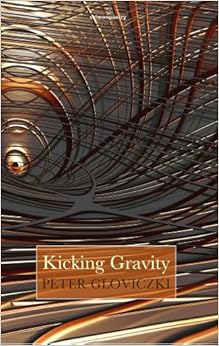REVIEW
A Hint of Threat Suggests Itself: Peter Joseph Gloviczki's Kicking Gravity

Kicking Gravity by Peter Joseph Gloviczki
Salmon Poetry, 2013 (70 pages)
ISBN: 978-1-908836-24-3
Salmon Poetry, 2013 (70 pages)
ISBN: 978-1-908836-24-3
I discovered the work of Minneapolitan poet Peter J. Gloviczki via elimae magazine, which published a strikingly straightforward three-word poem of his way back in 2008. Here it is, in its epigrammatic entirety:
Her grin
is a rope.
Gloviczki's deceptively simple metaphor (one thing = another) allows great room for
speculation, and it's easy to elaborate flirtatious tales of fated attraction or steamy scenes
of BDSM and innuendo. (One astute group of students in Newark, New Jersey devised an
especially horrifying story that involved an escaped slave and the town sheriff's sinister
daughter in antebellum Carolina.) The bulk of Gloviczki's chapbook, Drinking River Water,
adheres to haiku-like limits, and I've since admired Gloviczki's ability to craft subtle,
suggestive lyrics with tight syllabic restriction.
is a rope.
Kicking Gravity brings the taut-lipped whisper of "Her grin" to expressive fruition, in compact verses that often create parallactic shifts from subject to object. The effect is like persistent, forward motion that somehow also reels the reader away. Glovickzi achieves this through fractured, haunting imagery: an outline of Indiana that enlarges as Dad scuffs the floor with table legs, or an abandoned snowman looming in the frosted window at dinner. Half the collection's composed in what appears to be prose, lines that run from margin to margin. Gloviczki's knack for narrative persists, marked by the enigmatic gestures of an intimate, eliding voice that depicts scenes of strange domesticity, populated with family members-often called only sister, aunt, or Mom—a violent father figure, and the given names of many women (Sara, Anne, Jenna, et c.). But the most dangerous and enticing moments manifest in romantic relationships. Take "Dating Caroline," e.g.:
Sharp noises made her shiver, postcards from men who slept
next to her. The wrong gust of wind sent her sprinting, and
windows shutting made her jump. Thunder took dinner under
the table. I should know. I was her breakfast muffin, her
morning pretzel-anything for the one who called me lover. (24)
Before bed, I used to lie awake and count as many dots on the
ceiling as I could. I once counted thirteen hundred; I was
seventeen. Our house burned down the next summer. I still lie
in bed sometimes. My wife will ask me what I'm doing, and
I'll tell her I'm remembering. I never tell her more than that; I
don't plan to. (46)
I pull the check out from under the coffee cup. Tell me, Mom
says, why you let him die. I tell her that after a while there's
nothing you can do, that after a while the organs go rogue. She
pulls out a pocketknife and sets it on the table. With a sure
hand, she spins it. I watch the knife make its red circles, how
the Swiss cross becomes a blur and then stops. (51)
It's worth noting that "Dating Caroline" took second place in a flash fiction contest sponsored by Blue Earth Review the same year elimae published "Her grin." Notable, because attempts to distinguish "prose poetry" from "flash fiction" almost always hinge on naming whatever's at the heart of each genre. (I recall Robert Olen Butler defining a handy formula: if desire ? fiction.) Folks can debate the relevance of plot, syllabics, and character development until the cattle return, but Gloviczki seems actually to have eased the two into each other, blurring lines and ignoring camps: Kicking Gravity navigates the difficult terrain of interpersonal expression in passages of subtle, tantalizing language that leaves ample room for readers to enjoy the equation.
Diego BŠez writes regularly for Whole Beast Rag and Booklist. Poetry, fiction, and reviews
have appeared most recently in Kweli, Treehouse, and The Rumpus. He lives and teaches in
Chicago.
